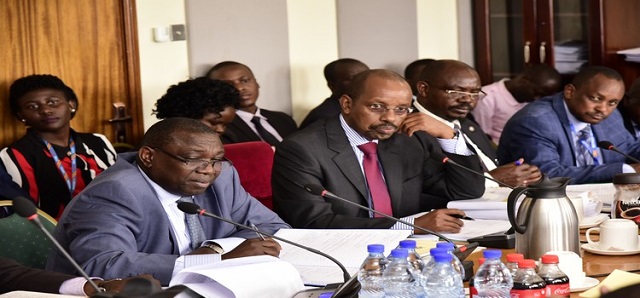
Kampala, Uganda | THE INDEPENDENT | The Secretary to Treasury Keith Muhakanizi says that wrong projections in the current 2019/2020 financial year have made management of the National Budget a big challenge.
Muhakanizi was on Tuesday appearing before Parliament’s Public Accounts Committee to respond to Auditor General’s queries raised in the financial years 2017/2018 and 2018/2019.
Before the committee could question him about Auditor General John Muwanga’s queries, Bukoto East MP Florence Namayanja asked Muhakanizi about the implementation of the current budget.
Muhakanizi said that the Ministry of Finance projects a revenue shortfall of 1.8 trillion Shillings at the end of the financial year in June 2020.
In May 2019, Parliament approved the 2019/2020 financial year budget totaling 40.48 trillion Shillings. Out of this, 27.957 trillion Shillings was Recurrent (10.5 trillion), Development expenditure (17.3 trillion) while 12.53 trillion was statutory expenditure charged directly on the Consolidated Fund.
The budget was to be financed by domestic revenue collections amounting 20.487 trillion Shillings, resources from the Petroleum Fund amounting 445.8 billion, Domestic Financing 2.32 trillion, Domestic Debt Refinancing 6.18 trillion, external budget support 675.2 billion, external project support 9.42 trillion and others.
Domestic and External Financing constituted 74.5 percent and 25.5 percent of the total resource envelope, respectively.
Muhakanizi says that Uganda Revenue Authority (URA) had experienced a huge shortfall in revenue collection citing that in the first quarter of the financial year alone, there was a shortfall of 670 billion Shillings.
He warns that government may not be able to fund a significant portion of country’s expenditure during the next quarter as a result of revenue shortfalls that they project to be 1.8 trillion Shillings at the end of the financial year.
The Secretary to Treasury says that the predicament will be exacerbated by emergency crises like the locust invasion, coronavirus threat and washed away roads.
Muhakanizi did not shy away from blaming Parliament saying that its decision to delay some revenue measures like the digital stamps is responsible for the crisis.
Besides the digital stamps, parliament refused the proposal for accounting for rental tax, imposition of a minimum tax of 0.5 percent on losses carried forward beyond seven years and the repeal of 1 percent of withholding tax on agricultural supplies. Ministry of Finance says that these decisions led to Shillings 48 billion revenue shortfalls.
In December 2019, the Minister of State for Planning David Bahati presented a domestic loan request before parliament to finance budget pressures citing a huge revenue shortfall experienced by government.
According to the domestic loan request currently before Parliament’s National Economy Committee, government says that out of the Shillings 2.43 trillion, Euros 300 million is to be borrowed from Stanbic Bank Uganda Limited and another Euro 300 million from the Trade Development Bank.
The money once approved by Parliament will be repaid in 7 years at an interest of 4.4 percent. The grace period provided by the banks is 2 years.
Government partly attributed the low revenue performance to delays in implementation of some administrative measures which had been projected to generate revenues. These included the Digital Tax Stamps (150 billion Shillings), electronic fiscal devices (170 billion Shillings), rental income tax (174.63 billion Shillings) and the MTN Uganda national operator license fees of US Dollars 100 million.
“In order to implement the budget for financial year 2019/2020 and meet the additional expenditure pressures, Government must borrow either domestically or externally to cover the budget deficit,” Bahati then said.
Bahati also says that the shortfall has also been caused by additional expenditure pressures including non-receipt of World Bank budget support funds and non-receipt of capital gains tax totalling to 2.43 billion Shillings.
He added that the financial year 2019/2020 has additional expenditure pressures amounting to 1.432 trillion Shillings intended for security or classified expenditure, wage shortfalls, counterpart funding obligations for projects and emergencies.
In his recent statement to parliament, Bahati said that the required loan will also fund the election roadmap that is behind schedule.
******
URN
 The Independent Uganda: You get the Truth we Pay the Price
The Independent Uganda: You get the Truth we Pay the Price



